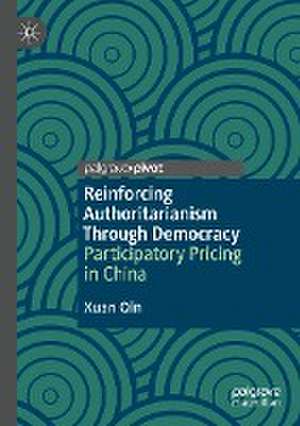Reinforcing Authoritarianism Through Democracy: Participatory Pricing in China
Autor Xuan Qinen Limba Engleză Paperback – 27 ian 2022
The mixture of these two mechanisms assures participants and educates them, producing cooperative citizens desired by the government. This is referred to as the partial empowerment strategy, which challenges the traditional assumption of the correlation between deliberation and empowerment. When authoritarian control influences deliberations in a form that obstructs the natural developmental process of empowerment, it acts as a filter that encourages only some form of empowerment, but precludes those that are too risky for the government. This exertion of dominance through a participatory form reflects the development of governance capability of China as a modern authoritarian state and explains its “surprising” resilience.
| Toate formatele și edițiile | Preț | Express |
|---|---|---|
| Paperback (1) | 443.36 lei 6-8 săpt. | |
| Springer Nature Singapore – 27 ian 2022 | 443.36 lei 6-8 săpt. | |
| Hardback (1) | 449.53 lei 6-8 săpt. | |
| Springer Nature Singapore – 26 ian 2021 | 449.53 lei 6-8 săpt. |
Preț: 443.36 lei
Nou
Puncte Express: 665
Preț estimativ în valută:
84.84€ • 92.44$ • 71.49£
84.84€ • 92.44$ • 71.49£
Carte tipărită la comandă
Livrare economică 23 aprilie-07 mai
Preluare comenzi: 021 569.72.76
Specificații
ISBN-13: 9789813349582
ISBN-10: 9813349581
Pagini: 96
Ilustrații: XI, 96 p. 2 illus.
Dimensiuni: 148 x 210 mm
Greutate: 0.15 kg
Ediția:1st ed. 2021
Editura: Springer Nature Singapore
Colecția Palgrave Pivot
Locul publicării:Singapore, Singapore
ISBN-10: 9813349581
Pagini: 96
Ilustrații: XI, 96 p. 2 illus.
Dimensiuni: 148 x 210 mm
Greutate: 0.15 kg
Ediția:1st ed. 2021
Editura: Springer Nature Singapore
Colecția Palgrave Pivot
Locul publicării:Singapore, Singapore
Cuprins
Chapter 1: Introduction.- Chapter 2: History and Background Information.- Chapter 3: Mechanism of Government Control.- Chapter 4: Case Study.- Chapter 5: Participants’ Responses towards the Control Mechanism.- Chapter 6: Conclusion.
Notă biografică
Xuan Qin is a Lecturer and Research Fellow at the Institute for Advanced Study in Social Sciences in Fudan University. She received her Ph.D. from the Nanyang Technological University. Her research interests include democratic theory and statistical analysis. She currently serves as an Editor for the Chinese Political Science Review.
Textul de pe ultima copertă
“This is an excellent study of a set of democratic practices, established by Chinese government, to manage the impact of the transition to a market economy on citizens and businesses: participatory pricing. Xuan Qin’s careful and methodologically wide-ranging analysis provides fascinating insight into the ways in which participatory pricing’s democratic implications are curated and limited by China’s authoritarian state. It is essential reading for anyone interested in the fuzzy boundary between democracy and authoritarianism.”
–Dr. Catherine Owen, British Academy Postdoctoral Fellow, Department of Politics, University of Exeter
This book provides empirical evidence to show how democratic experiments are harnessed to achieve control and support authoritarianism, through the lens of participatory pricing, which is one of the most important forms of deliberative democracy in China. The crucial point is an interlacement of easily perceptible improvement in empowerment (voluntary enrollment, disclosure of information and opportunities for expression during events) and hidden control (delicately designed procedures and pre-existing frameworks that influence participants in how they think, and when they talk).The mixture of these two mechanisms assures participants and educates them, producing cooperative citizens desired by the government. This is referred to as the partial empowerment strategy, which challenges the traditional assumption of the correlation between deliberation and empowerment. When authoritarian control influences deliberations in a form that obstructs the natural developmental process of empowerment, it acts as a filter that encourages only some form of empowerment, but precludes those that are too risky for the government. This exertion of dominance through a participatory form reflects the development of governance capability of China as a modern authoritarian state and explains its “surprising” resilience.Xuan Qin is a Lecturer and Research Fellow at the Institute for Advanced Study in Social Sciences in Fudan University. She received her Ph.D. from the Nanyang Technological University. Her research interests include democratic theory and statistical analysis. She currently serves as an Editor for the Chinese Political Science Review.
–Dr. Catherine Owen, British Academy Postdoctoral Fellow, Department of Politics, University of Exeter
This book provides empirical evidence to show how democratic experiments are harnessed to achieve control and support authoritarianism, through the lens of participatory pricing, which is one of the most important forms of deliberative democracy in China. The crucial point is an interlacement of easily perceptible improvement in empowerment (voluntary enrollment, disclosure of information and opportunities for expression during events) and hidden control (delicately designed procedures and pre-existing frameworks that influence participants in how they think, and when they talk).The mixture of these two mechanisms assures participants and educates them, producing cooperative citizens desired by the government. This is referred to as the partial empowerment strategy, which challenges the traditional assumption of the correlation between deliberation and empowerment. When authoritarian control influences deliberations in a form that obstructs the natural developmental process of empowerment, it acts as a filter that encourages only some form of empowerment, but precludes those that are too risky for the government. This exertion of dominance through a participatory form reflects the development of governance capability of China as a modern authoritarian state and explains its “surprising” resilience.Xuan Qin is a Lecturer and Research Fellow at the Institute for Advanced Study in Social Sciences in Fudan University. She received her Ph.D. from the Nanyang Technological University. Her research interests include democratic theory and statistical analysis. She currently serves as an Editor for the Chinese Political Science Review.
Caracteristici
Provides empirical evidence to show how democratic experiments are harnessed to achieve control and support authoritarianism Argues that the exertion of dominance through a participatory form reflects the development of governance capability of China as a modern authoritarianism Is of interest to readers interested in the field of comparative politics, democratization, authoritarianism, and China studies
